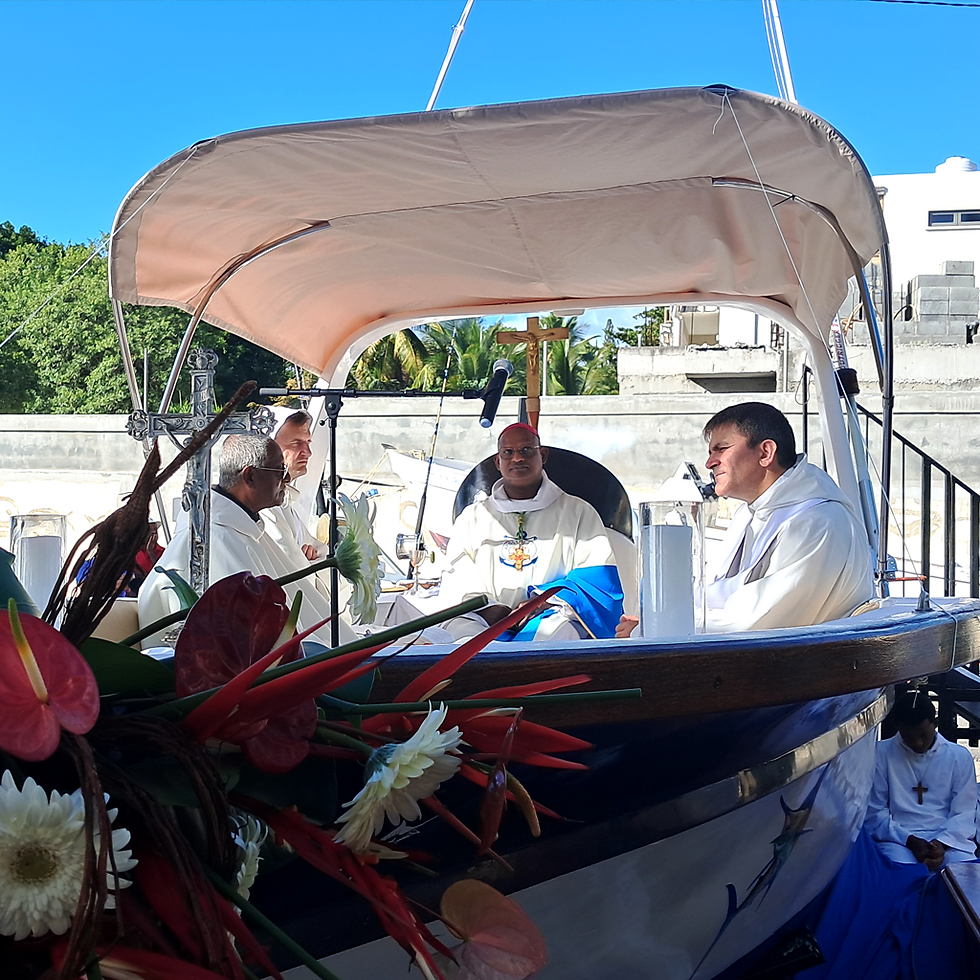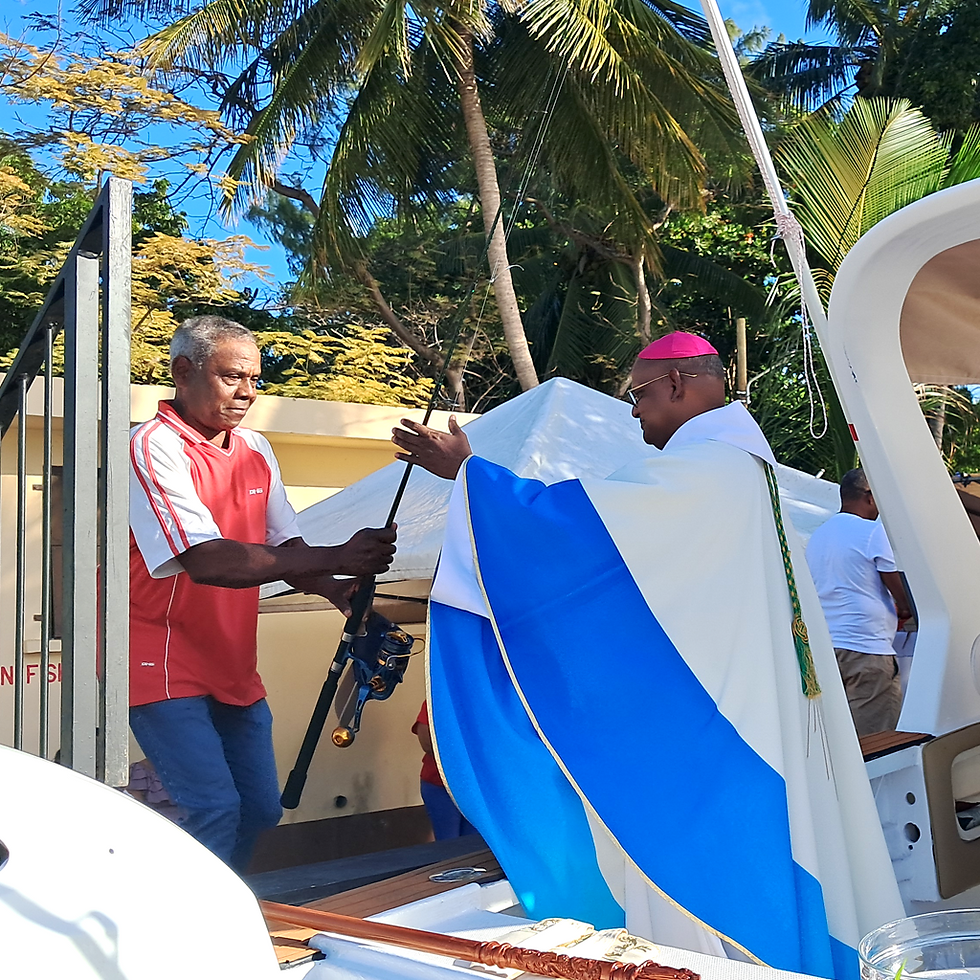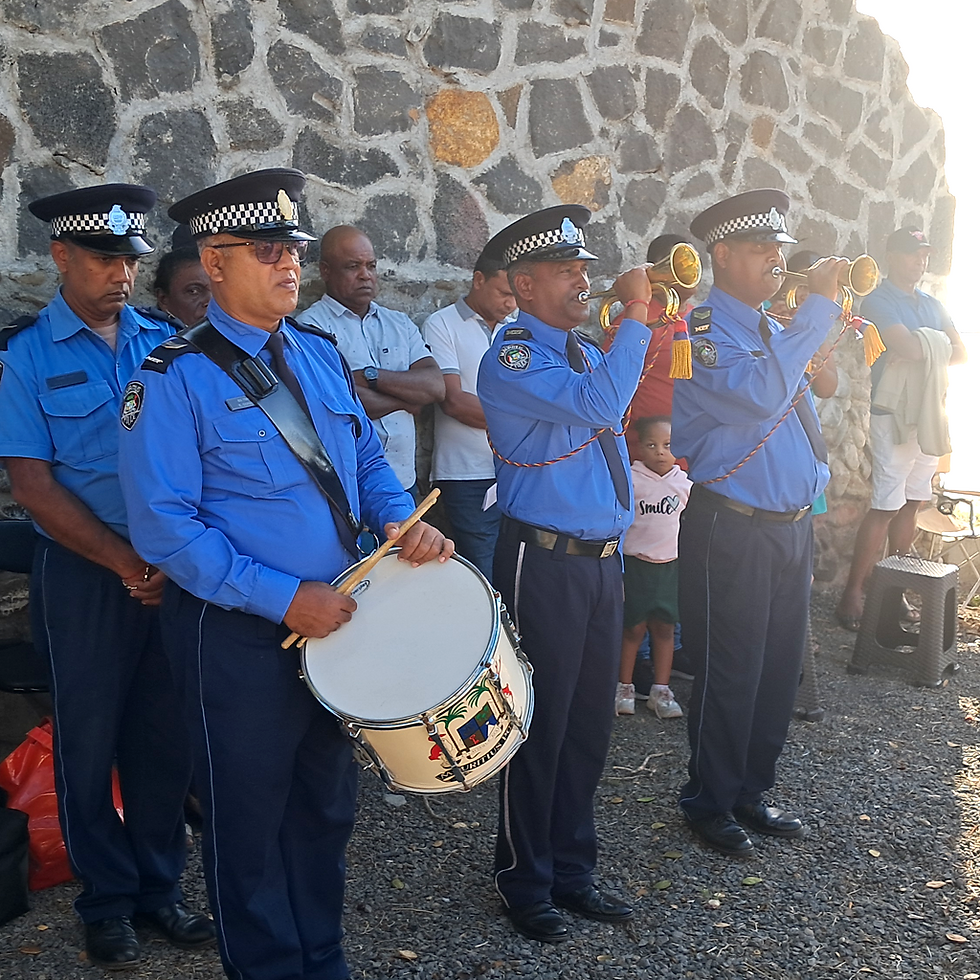People of the sea: Forgotten lives, silent suffering
- Nicolas Marie-Jeanne
- Jul 16
- 4 min read

Society – A boat stranded on dry land, an altar erected at its bow, and faithful turned toward the ocean — the scene was rich in symbolism. On Sunday, July 13, 2025, the coastal village of Tamarin hosted the celebration of Sea Sunday, held each year on the second Sunday of July. The mass was presided over by Bishop Jean Michaël Durhône, accompanied by Fathers Mariusz Totlinski and Arnaud Bonassies, parish priest and vicar of Saint-Augustin respectively, as well as Father Jacques-Henri David, chaplain of the Apostleship of the Sea. The celebration was marked by a powerful homily delivered by Father David.
A unique altar bridging sea and faith
The altar, unusually placed on the bow of the grounded boat, stood out for its simplicity and harmony with the maritime setting. Sheltered by a small white canopy that provided shade and defined the sacred space, it followed the layout of a traditional mass. A white cloth covered the altar table, with a prominent metal cross at its center. A standing microphone allowed the priest to address the crowd. On the right, green plants and floral decorations added a natural and solemn touch. The boat itself, propped on blocks and partly draped in a bright blue fabric evoking the sea, reinforced the symbolic connection between faith, the ocean, and those who work on it — placing seafarers literally at the heart of the celebration.
Each year, the Catholic Church invites prayers for seafarers, fishermen, and their families. But this year’s celebration carried a broader message — calling for awareness of the often overlooked reality of the maritime world.
Father David reminded the congregation of a little-known truth: 90% of everything we use or consume arrives by sea. Invisible men cross oceans in harsh conditions so that goods reach our shores.
Seafarers live in close quarters for months: “There are 12 to 15 men living in a confined space for six months, seeing each other every day. It’s not easy,” he explained. Even during port stops, rest is rare: “Unloading takes around seven hours. A few crew members may go ashore — for barely two hours — just enough time to buy shampoo or soap and return to the ship.”
Moral suffering: A silent struggle

More alarming is the silent psychological suffering. The International Labour Organization recently highlighted a growing issue: harassment on board. “I used to overlook it,” Father David admitted. “When a seafarer asked for help to quit, we never questioned why. But often, behind those requests lies deep distress — sometimes even suicidal thoughts.” The ILO now urges vigilance and the establishment of support services for isolated workers.
Fishing crews from Madagascar, Vietnam, or the Philippines often face even tougher realities. Hired under unclear contracts they don’t understand, they live and work in demanding conditions, often without proper guidance or guaranteed pay. Currently in Mauritius, 20 Malagasy fishermen are awaiting regularisation and repatriation. “We must finalize their contracts, send them home — and in the meantime, feed them. Thankfully, our partners are helping. These men just want to return home.”
Father David also addressed the broader future of the sea in Mauritius. No longer just an island, Mauritius is now an ocean state, with vast maritime territory. Yet, the sector suffers from a shortage of skilled workers. He urged for greater youth engagement in emerging ocean-based careers — from marine conservation and aquaculture to ocean sciences. “We’re starting to raise awareness: the future lies in this growing ocean nation.”
Before the celebration ended, a blessing of the boats took place. From the beach, worshippers, seafarers, and Apostleship of the Sea members watched as Bishop Durhône, aboard a boat with Father David, sprinkled holy water along the coastline — a simple yet meaningful conclusion to a ceremony dedicated to those who live by the sea.
Major Challenges Facing Mauritian Fishermen

• An aging and endangered profession
Most of Mauritius’ fishermen today are over 50 years old. Few young people are taking up this traditional trade. Many older fishermen even refuse to see their children follow in their footsteps. This generational disconnect threatens the survival of ancestral knowledge and puts the future of the profession at risk.
• The impact of climate change on fishing
As the sea and climate evolve, fishing methods must adapt. Training programs now offer support, but Mauritius’ shift from island state to ocean state requires new human and technical skills. Encouraging youth to explore careers in fishing, aquaculture, conservation, or marine sciences is now essential.
• The drug crisis in the fishing world
Drug use also affects the fishing sector. The physical and mental toll of working at sea pushes some fishermen toward substance abuse. Alarmingly, some boat owners provide drugs before trips or advance money to fund addictions. This leads to dangerous situations — like in Seychelles, where helicopters have had to rescue fishermen suffering from withdrawal. The issue underscores the urgent need to address social and health risks within the fishing community.

Comments